Q&A with Ana Cristina Marchena, a community leader from Guarumo, Cáceres
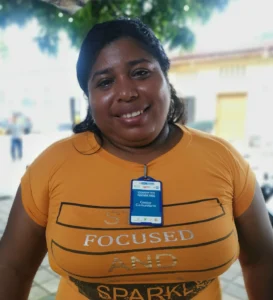 Since 2020, with support from the Government of Colombia, the Land for Prosperity Activity is leading a massive land formalization campaign in the municipality of Cáceres, in the Bajo Cauca region. Due to the presence of armed groups, illicit crops, land mines, and artisanal gold mining, the initiative depends on community mobilizers for several important steps of the property formalization process. In this interview, Ana Cristina Marchena, a community leader from Guarumo, Cáceres, talks about her role and the value community mobilizers add.
Since 2020, with support from the Government of Colombia, the Land for Prosperity Activity is leading a massive land formalization campaign in the municipality of Cáceres, in the Bajo Cauca region. Due to the presence of armed groups, illicit crops, land mines, and artisanal gold mining, the initiative depends on community mobilizers for several important steps of the property formalization process. In this interview, Ana Cristina Marchena, a community leader from Guarumo, Cáceres, talks about her role and the value community mobilizers add.
How would you describe the lives of the families in your town, Guarumo?
Guarumo has been badly hit by violence. Here, people depend on informal economies because there are no industries. We have artisanal gold mining, and with that come other problems and bad actors. There are moments of abundance when there is gold, and moments of scarcity. It is a very vulnerable situation. When it comes to education, if people want to go to university, they have to leave. Here, most young people who finish high school end up going to the river, to the mines. If they don’t end up in mining, there is a culture of choosing between “I’ll join the army, or I’ll join the other side”, and they end up being recruited by armed groups. Almost all families I know have been victims or have had problems with these groups. It is very common.
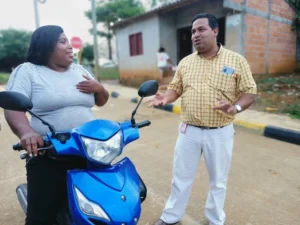
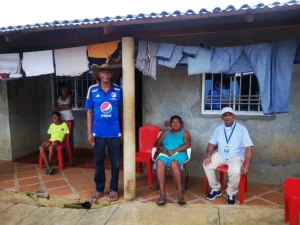
How does the violence affect the population?
There are many displaced people in Guarumo. The violence was hard between 2018 and 2020, and many of the victims were forcefully displaced from their homes. We’ve only had six months of peace recently. During those years, I was one of the few who stayed in the community, in the area, because we couldn’t get out or didn’t have anywhere to go. With a big family, where can you go? It is very difficult. In Cáceres, the violence has taught us to be resilient and to take care of our own while praying, because God is the only one who protects us.
What are your tasks as community mobilizer, as part of the land formalization process in Cáceres?
My tasks consist of supporting the land formalization teams. In Cáceres, people can’t just go approach a community alone; they always need someone with them. The community recognizes me as a leader, because I have worked with women and children. When I invite people to participate, they believe me because they know I support programs and projects for the community. I also help to explain the land formalization process to farmers, in our language. That you can’t own land in certain areas, like close to the river, or that the government cannot award a property that is right next to the highway.
Why are community mobilizers valuable to the program?
We are an important part of the parcel sweep because we know our land and we know our community. We have experienced first-hand the difficulties and needs of the community. And as mobilizers, we do our job without expecting any compensation, we do it from the heart because we know that we have big problems that are related to land tenure.
As a community mobilizer, how do you approach and interact with armed groups?
First, they know about our work and know that we are trying to help the community and trying to not affect them. These programs greatly benefit the community, so they respect us as leaders and as mobilizers. Sometimes we do have to ask for authorization to allow the program to enter certain areas, because these are areas where they haven’t allowed strangers or people outside the community in. We are forced to interact with them, there is no other way.
And when there are properties occupied by them that are going to be formalized, what do you do?
We have had difficulties in some places that we know are occupied by them and where they don’t let us go. But we don’t try to force them either. With the parcel sweep, they are going to have to let us enter because we know all areas will be formalized.
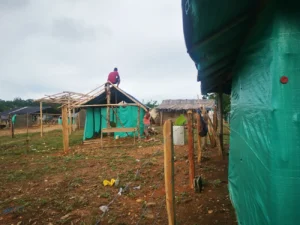
What topics were you trained in as community mobilizers?
They taught us about land tenure, like who is an owner and who is an occupant. They taught us basic concepts about land formalization so we can explain it to farmers. They also taught us about land mines, because we go to rural areas and have to know how to walk and avoid being a victim. They taught us about ‘agricultural productive units’. We usually have an agronomist with us, and we explain to people that their crops can also be sold. A lot of them grow cacao and we get there and tell them “look, you can sell these products in town” so they know they can access other sources of income.
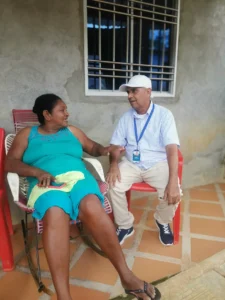
What challenges have you faced with the communities?
There are challenges for the same reason that the community is vulnerable. Many people live in places where they shouldn’t, and they have been there for many years and already have their dream based on the houses they have built. For us to go there and tell them that they won’t receive a property title is not easy. Their reaction is understandable. These people need a housing subsidy and must be relocated to another area. But Cáceres is very poor and that is a big challenge.
Do you think land formalization can change the way you face illicit crops?
For us, illicit crops are part of our economy. Many people come to this sector to collect them and they bring money and investment to the community. They see them as a source of income and not as something illegal. It is one of the few job opportunities there are. If they come to offer projects to replace these crops, they need to make sure they are just as profitable.
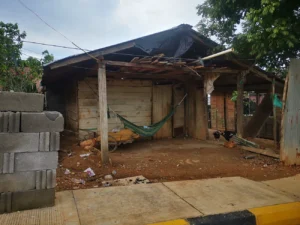
Footnotes
USAID Land for Prosperity
Cáceres, Antioquia, Colombia
© 2022 Land for Prosperity
Cross posted from Land for Prosperity Exposure site

